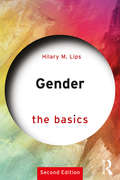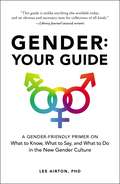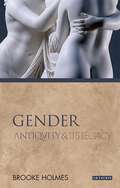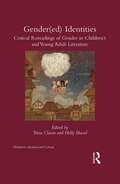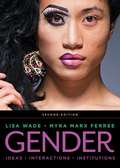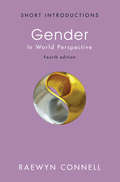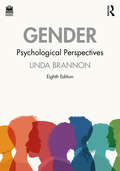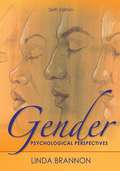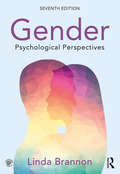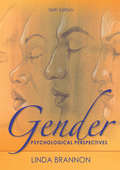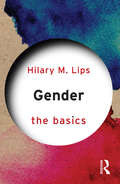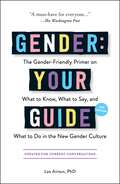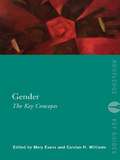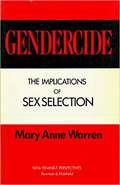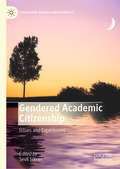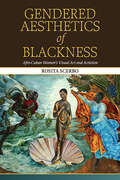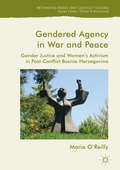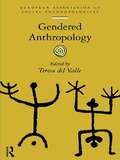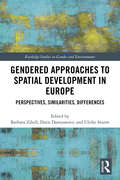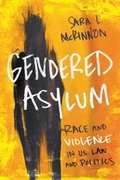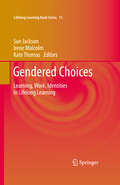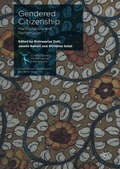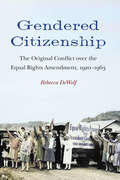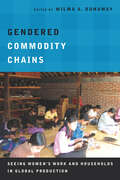- Table View
- List View
Gender: 2nd edition (The Basics)
by Hilary M. LipsGender: The Basics is an engaging introduction to the influence of cultural, historical, biological, psychological, and economic forces on ways in which we have come to define and experience femininity and masculinity, and on the impact and importance of gender categories. Highlighting that there is far more to gender than biological sex, it examines theories and research about how and why gender categories and identities are developed and about how interpersonal and societal power relationships are gendered. It takes a global and intersectional perspective to examine the interaction between gender and a wide range of topics including: Relationships, intimacy, and concepts of sexuality across the lifespan The workplace and labour markets Gender related violence and war Public health, poverty, and development Gender and public leadership This new edition includes increased coverage of trans visibility and activism, LGBTQ studies and critical masculinity studies, global developments in women’s political leadership, links between gender and economic wellbeing, and cyberbullying. Supporting theory with examples and case studies from a variety of contexts, suggestions for further reading, and a detailed glossary, this text is an essential read for anyone approaching the study of gender for the first time.
Gender: A Gender-Friendly Primer on What to Know, What to Say, and What to Do in the New Gender Culture
by Lee AirtonAn authentic and accessible guide to understanding—and engaging in—today’s gender conversation.The days of two genders—male, female; boy, girl; blue, pink—are over, if they ever existed at all. Gender is now a global conversation, and one that is constantly evolving. More people than ever before are openly living their lives as transgender men or women, and many transgender people are coming out as neither men or women, instead living outside of the binary. Gender is changing, and this change is gaining momentum. We all want to do and say the right things in relation to gender diversity—whether at a job interview, at parent/teacher night, and around the table at family dinners. But where do we begin? From the differences among gender identity, gender expression, and sex, to the use of gender-neutral pronouns like singular they/them, to thinking about your own participation in gender, Gender: Your Guide serves as a complete primer to all things gender. Guided by professor and gender diversity advocate Lee Airton, PhD, you will learn how gender works in everyday life, how to use accurate terminology to refer to transgender, non-binary, and/or gender non-conforming individuals, and how to ask when you aren’t sure what to do or say. It provides you with the information you need to talk confidently and compassionately about gender diversity, whether simply having a conversation or going to bat as an advocate. Just like gender itself, being gender-friendly is a process for all of us. As revolutionary a resource as Our Bodies, Ourselves, Gender: Your Guide invites everyone on board to make gender more flexible and less constricting: a source of more joy, and less harm, for everyone. Let’s get started.
Gender: Antiquity And Its Legacy (Ancients And Moderns Ser.)
by Brooke HolmesGender has now become a pervasive topic in the humanities and social sciences. Yet despite its familiarity within universities and colleges, some have argued that the radical debates which first characterized gender studies have become ghettoized or marginalized -- so that gender no longer makes the impact on creative thinking and ideas that it once did. Brooke Holmes here rescues ancient ideas about sex and gender in order precisely to reinvigorate contemporary debate. She argues that much writing on gender in the classical age fails to place those ancient ideas within their proper historical contexts. As a result, the full transformational force of that thinking is often overlooked. In this short, lively book, the author offers a sophisticated and historically rounded reading of gender in antiquity in order to map out the future of contemporary gender studies. By re-examining ancient notions of sexual difference, bodies, culture, and identity, Holmes shows that Plato, Aristotle, the Stoics, Epicureans and others force us to reassess what is at stake in present-day discussions about gender. The ancient world thus offers a vital resource for modern gender theory.
Gender: Critical Rereadings of Gender in Children's and Young Adult Literature (Children's Literature and Culture)
by Tricia Clasen and & Holly HasselThis volume brings together diverse, cross-disciplinary scholarly voices to examine gender construction in children's and young adult literature. It complements and updates the scholarship in the field by creating a rich, cohesive examination of core questions around gender and sexuality in classic and contemporary texts. By providing an expansive treatment of gender and sexuality across genres, eras, and national literature, the collection explores how readers encounter unorthodox as well as traditional notions of gender. It begins with essays exploring how children's and YA literature construct communities formed by gender, ethnicity, sexuality, and in face-to-face and virtual spaces. Section II's central focus is how gendered identities are formed, unpacking how texts for young readers ranging from Amish youth periodicals to the blockbuster Divergent series trace, reproduce, and shape gendered identity socialization. In section III, the essential literary function of translating trauma into narrative is addressed in classics like Anne of Green Gables and Pollyanna, as well as more recent works. Section IV's focus on sexuality and romance encompasses fiction and nonfiction works, examining how children's and young adult literature can serve as a regressive, progressive, and transgressive site for construction meaning about sex and romance. Last, Section IV offers new readings of paratextual features in literature for children -- from the classic tale of Cinderella to contemporary illustrated novels. The key achievement of this volume is providing an updated range of multidisciplinary and methodologically diverse analyses of critically and commercially successful texts, contributing to the scholarship on children's and YA literature; gender, sexuality, and women's studies; and a range of other disciplines.
Gender: Ideas, Interactions, Institutions
by Myra Marx Ferree Lisa WadeWade and Ferree's "Gender" is a sophisticated yet accessible introduction to sociological perspectives on gender. Drawing on memorable examples mined from history, pop culture, and current events, "Gender" deftly moves between theoretical concepts and applications to everyday life. New discussions of #metoo, toxic masculinity, and gender politics in the Trump era help students participate in today's conversation about gender. -- From product description.
Gender: In World Perspective (Short Introductions #13)
by Raewyn W. ConnellHow can we understand gender in the contemporary world? What psychological differences now exist between women and men? How are masculinities and femininities made? And how is gender entwined in global politics and debates over trans issues? Raewyn Connell – one of the world's leading scholars in the field – answers these questions and more. Her book provides a sophisticated yet accessible introduction to modern gender studies, covering empirical research from all parts of the world, in addition to theory and politics. As well as introducing the field, Gender provides a powerful contemporary framework for gender analysis with a strong and distinctive global awareness. Highlighting the multidimensional character of gender relations, Connell shows how to link personal life with large-scale organizational structures, and how gender politics changes its form in changing situations. The fourth edition of this influential book brings the statistical picture of gender inequalities up to date, and offers new close-focus case studies of gender research. Like previous editions, it examines gender politics and global power relations, but with added discussion around contemporary issues of intersectionality, populism, gender-based violence, trans struggles and environmental change. It also speaks at the intimate level, about embodied gender and personal relationships. Gender moves from personal experience to global problems, offering a unique perspective on gender issues today.
Gender: Psychological Perspectives
by Linda BrannonThis fully updated and revised eighth edition examines the behavioral, biological, and social context in which people express gendered behaviors, utilizing the latest research to help students think critically about research findings and stereotypes and provoking them to examine and revise their own preconceptions.The text’s unique pedagogical program helps students understand the portrayal of gender in the media and the application of gender research in the real world. Headlines from the news open each chapter; Gendered Voices present true personal accounts of people’s lives; According to the Media boxes highlight gender-related coverage in newspapers, magazines, books, TV, and movies; while According to the Research boxes offer the latest scientifically based research to help students analyze the accuracy and fairness of gender images presented in the media. Additionally, Considering Diversity sections emphasize the cross-cultural perspective of gender.Key features of the new edition include Expanded discussion of transgender and non-binary identities 12 new headline articles including topics ranging from the myth of biological sex to the wars over sex education and the factors involved in the gender pay gap Comprehensive digital resources with content for instructors and students. Intended for undergraduate or graduate courses on the psychology of gender, psychology of sex, gender issues, women in society, and women’s or men’s studies, this book is also applicable to sociology and anthropology courses on diversity.
Gender: Psychological Perspectives (6th Edition)
by Linda BrannonThis book examines the topic of gender--the behaviors and attitudes that relate to (but are not entirely congruent with) biological sex.
Gender: Psychological Perspectives, Seventh Edition
by Linda BrannonGender: Psychological Perspectives synthesizes the latest research on gender to help students think critically about the differences between research findings and stereotypes, provoking them to examine and revise their own preconceptions. The text examines the behavioral, biological, and social context in which women and men express gendered behaviors. The text’s unique pedagogical program helps students understand the portrayal of gender in the media and the application of gender research in the real world. Headlines from the news open each chapter to engage the reader. Gendered Voices present true personal accounts of people's lives. According to the Media boxes highlight gender-related coverage in newspapers, magazines, books, TV, and movies, while According to the Research boxes offer the latest scientifically based research to help students analyze the accuracy and fairness of gender images presented in the media. Additionally, Considering Diversity sections emphasize the cross-cultural perspective of gender. This text is intended for undergraduate or graduate courses on the psychology of gender, psychology of sex, psychology of women or men, gender issues, sex roles, women in society, and women’s or men’s studies. It is also applicable to sociology and anthropology courses on diversity. Seventh Edition Highlights: 12 new headlines on topics ranging from gender and the Flynn effect to gender stereotyping that affects men Coverage of gender issues in aging adults and transgendered individuals Expanded coverage of diversity issues in the US and around the globe, including the latest research from China, Japan, and Europe More tables, figures, and photos to provide summaries of text in an easy-to-absorb format End-of-chapter summaries and glossary Suggested readings for further exploration of chapter topics Companion website at www.routledge.com/cw/Brannon containing both instructor and student resources
Gender: Psychological Perspectives, Sixth Edition
by Linda BrannonThis bestselling text presents research about gender and helps students think critically about the differences between research findings and gender stereotypes. It examines the biology and social context in which women and men express gendered behaviors. Defining gender as the behaviors and attitudes that relate to (but are not entirely congruent with) biological sex, the book focuses on research and scholarship to provide the material for a critical review and an overall picture of gender from a psychological perspective. To highlight how research findings can relate to people's lives, the book supplements the review of scholarly research with personal, narrative accounts of gender-relevant aspects of people's lives. To emphasize the cross-cultural perspective of gender, the book including a section on diversity in most chapters but also weaves diversity issues throughout the text. The personal narrative and diversity highlights help to balance the research-based scholarship with the personal experience of gender.
Gender: The Basics
by Hilary LipsGender: The Basics is an engaging introduction which examines the impact of cultural, historical, biological, psychological and economic forces on qualities which have come to be defined as masculine or feminine. Highlighting that there is far more to gender than biological sex, it takes a global perspective to examine the interaction between gender and a wide range of topics including: • Relationships, intimacy and concepts of sexuality • The workplace and labour markets • Gender related violence and war • Public health, poverty and development • The ageing process Supporting theory with examples and case studies from a variety of contexts, suggestions for further reading and a detailed glossary, this text is an essential read for anyone approaching the study of gender for the first time.
Gender: The Gender-Friendly Primer on What to Know, What to Say, and What to Do in the New Gender Culture
by Lee AirtonBe a part of the ever-evolving conversation around gender and discover how to navigate gender diversity in today&’s families, communities, and workplaces in this updated edition that is &“an invaluable resource for both new and veteran allies&” (Library Journal, starred review).Gender is now a global conversation, and one that is constantly evolving. More people than ever before are openly living their lives as transgender men or women, and many transgender people are coming out as neither men nor women, instead living outside the binary. Gender is changing, and this change is gaining momentum. From the differences among gender identity, gender expression, and sex, to the use of gender-neutral pronouns like singular they/them to thinking about your own participation in gender, Gender: Your Guide, 2nd Edition serves as a complete primer to all things gender. Guided by professor and gender diversity advocate Lee Airton, PhD, learn how gender works in everyday life; how to use accurate terminology to refer to transgender, nonbinary, and/or gender nonconforming individuals; and how to ask when you aren&’t sure what to do or say. It provides you with the information you need to talk confidently and compassionately about gender diversity, whether simply having a conversation or going to bat as an advocate. In this updated edition, Dr. Airton explores updated definitions of intersex people, conversion therapy bans, transgender students in sports, online and social community discussions, updated pop culture references, and much more. Just like gender itself, being gender-friendly is a process for all of us. Gender: Your Guide, 2nd Edition invites everyone on board to make gender more flexible and less constricting: a source of more joy, and less harm, for everyone.
Gender: The Key Concepts (Routledge Key Guides)
by Mary Evans Carolyn H. WilliamsThis invaluable volume provides an overview of 37 terms, theories and concepts frequently used in gender studies which those studying the subject can find difficult to grasp. Each entry provides a critical definition of the concept, examining the background to the idea, its usage and the major figures associated with the term. Taking a truly interdisciplinary and global view of gender studies, concepts covered include: Agency Diaspora Heteronormativity Subjectivity Performativity Class Feminist Politics Body Gender identity Reflexivity. With cross referencing and further reading provided throughout the text, Gender: The Key Concepts unweaves the relationships between different aspects of the field defined as gender studies, and is essential for all those studying gender in interdisciplinary contexts as undergraduates, postgraduates and beyond.
Gendercide: The Implications Of Sex Selection (New Feminist Perspectives)
by Mary E. WarrenIn this thought-provoking feminist study of the moral issues raised by new and emerging technologies of sex selection, Mary Anne Warren shows that these technologies could substantially undermine and ultimately reverse the progress women have made in today's society.
Gendered Academic Citizenship: Issues and Experiences (Citizenship, Gender and Diversity)
by Sevil SümerThis book proposes the framework of gendered academic citizenship to capture the multidimensional and complex dynamics of power relations and everyday practices in the contemporary context of academic capitalism. The book proposes an innovative definition of academic citizenship as involving three key components: membership, recognition and belonging. Based on new empirical data, it identifies four ideal-types of academic citizenship: full, limited, transitional citizenship and non-citizenship. The different chapters of the book provide comprehensive reviews of the relevant research literature and offer original insights into the patterns of gender inequalities and practices of gendered academic citizenship across and within different national contexts. The book concludes by setting a comprehensive research agenda for the future. This book will be of interest to academic researchers and students at all levels in the disciplines of sociology, gender studies, higher education, political science and cultural anthropology.
Gendered Aesthetics of Blackness: Afro-Cuban Women's Visual Art and Activism (SUNY series, Afro-Latinx Futures)
by Rosita ScerboExplores how Afro-Cuban women's visual art challenges dominant narratives of race, gender, and identity.Gendered Aesthetics of Blackness delves deeply into the visual artistry and activism of Afro-Cuban women in Cuba and the United States. Influential in their communities yet overlooked in the mainstream art world and academic discourse, Harmonia Rosales, María Magdalena Campos-Pons, Belkis Ayón, and Susana Pilar practice what Rosita Scerbo calls "Decolonial AfroARTivism." These women use their art to challenge and disrupt dominant narratives, reclaim their identities and cultural heritage, and advocate for social justice. In centering their voices and meticulously analyzing their works, Scerbo not only enriches our understanding of Afro-Cuban visual culture but also pushes the boundaries of research. Groundbreaking in its decolonial approach and form, Gendered Aesthetics of Blackness engages a wide swath of sources and includes two interviews, with Rosales and with curator and popular educator Diarenis Calderon Tartabull.
Gendered Agency in War and Peace
by Maria O’ReillyThis book examines how gendered agency emerges in peacebuilding contexts. It develops a feminist critique of the international peacebuilding interventions, through a study of transitional justice policies and practices implemented in Bosnia & Herzegovina, and local activists’ responses to official discourses surrounding them. Extending Nancy Fraser’s tripartite model of justice to peacebuilding contexts, the book also advances notions of recognition, redistribution and representation as crucial components of gender-just peace. It argues that recognising women as victims and survivors of conflict, achieving a gender-equitable distribution of material and symbolic resources, and enabling women to participate as agents of transitional justice processes, are all essential for transforming the structural inequalities that enable gender violence and discrimination to materialise before, during, and after conflict. This study establishes a new avenue of analysis for understanding responses and resistances to international peacebuilding, by offering a sustained engagement with feminist social and political theory.
Gendered Agents: Women and Institutional Knowledge
by Paul A. Bové Silvestra BovéGendered Agents, edited by Silvestra Mariniello andPaul A. Bové, presents essays by influential feminist theorists who challenge traditional Western epistemology and suggest new directions for feminism. By examining both literary and historical discourses, such critics as Gayatri Spivak, Hortense Spillers, and Lauren Berlant assess questions of sexuality, ethics, race, psychoanalysis, subjectivity, and identity.Gathered from various issues of the journal boundary 2, the essays in Gendered Agents seek to transform the model of Western academic knowledge by restructuring its priorities and values. In the introduction, Mariniello urges feminists to begin anew but take as their starting place the achievements of feminism and feminist theory: an understanding of language that considers the implications of silence, the motivation to decompartmentalize experience, and the acknowledgement that everything is political. Challenging both a canonical organization of knowledge and the persistently self-referential "ghettoization" of feminism, contributors subsequently tackle subjects as diverse as pre-Marxist France, the American fetus, black intellectuals, queer nationality, and the art of literary interpretation.Contributors. Lauren Berlant, Karen Brennan, Margaret Cohen, Nancy Fraser, Elizabeth Freeman, Carol Jacobs, Silvestra Mariniello, Larysa Mykyta, Laura Rice, Ivy Schweitzer, Doris Sommer, Hortense J. Spillers, Gayatri Chakravorty Spivak, Judith Wilt
Gendered Anthropology (European Association of Social Anthropologists)
by Teresa Del ValleIn the last three decades, a remarkable degree of progress has occurred in the study of gender within anthropology. Gendered Anthropology offers a thought-provoking, lively examination of current debates focusing on sex and gender, race, ethnicity, politics and economics and provides insights which are still too often lacking in mainstream anthropology. Gendered Anthropology will be of particular value to undergraduates and lecturers in social anthropology and gender studies.
Gendered Approaches to Spatial Development in Europe: Perspectives, Similarities, Differences (Routledge Studies in Gender and Environments)
by Barbara Zibell Doris Damyanovic Ulrike SturmThis book explores the extent to which gendered approaches are evident and effective in spatial development in selected European countries. Beginning with an introduction to theories and concepts of gender, space and development, the book includes a brief historical review of gender in spatial planning and development throughout Europe in general, and an overview of different national frameworks in European countries, comparing legal, organisational and cultural similarities and differences. This is followed by a critical reflection on how simplifications and stereotypes of gender concepts are used in the practice of spatial development. The main part of the book offers a transnational discussion of planning practices on selected thematic topics. It starts with gender-sensitivity in urban master planning and at neighbourhood level referring to different types of planning manuals. Furthermore, the book focuses on gender-sensitive evaluation in urban planning as well as international agendas for sustainable development as a framework for a new generation of gender equality policies. The chapter authors assert that climate change, migration and austerity have threatened gender equality and therefore spatial development needs to be especially alert to gender dimensions. The editors end with an outlook and suggestions for further action and research on gender issues in spatial development. With inputs from some of Europe’s leading thinkers on gender, space and development, this volume is designed to inspire students, scholars and practitioners to reflect upon the contribution that gendered approaches can make in the various fields of spatial development and environmental planning.
Gendered Asylum: Race and Violence in U.S. Law and Politics
by Sara L MckinnonWomen filing gender-based asylum claims long faced skepticism and outright rejection within the U.S. immigration system. Despite erratic progress, the United States still fails to recognize gender as an established category for experiencing persecution. Gender exists in a sort of limbo segregated from other aspects of identity and experience. Sara L. McKinnon exposes racialized rhetorics of violence in politics and charts the development of gender as a category in U.S. asylum law. Starting with the late 1980s, when gender-based requests first emerged in case law, McKinnon analyzes gender and sexuality-related cases against the backdrop of national and transnational politics. Her focus falls on cases as diverse as Guatemalan and Salvadoran women sexually abused during the Dirty Wars and transgender asylum seekers from around the world fleeing brutally violent situations. She reviews the claims, evidence, testimony, and message strategies that unfolded in these legal arguments and decisions, and illuminates how legal decisions turned gender into a political construct vulnerable to U.S. national and global interests. She also explores myriad related aspects of the process, including how subjects are racialized and the effects of that racialization, and the consequences of policies that position gender as a signifier for women via normative assumptions about sex and heterosexuality.
Gendered Choices
by Kate Thomas Sue Jackson Irene MalcolmThis important book breaks new ground in addressing issues of gendered learning in different contexts across the (adult) life span at the start of the 21st century. Adult learning sits within a shifting landscape of educational policy, profoundly influenced by the skills agenda, by complex funding policies, new qualifications and the widening/narrowing participation debate. The book is unique in highlighting the centrality of gendered choices to these developments which shape participation in and experiences of lifelong learning. Gendered Choices critically examines the continued expansion of a skills-based approach in areas of lifelong learning, including career decisions, professional identities and informal networks. It explores key intersections of adult learning from a gender perspective: notably participation, workplace learning and informal pathways. Drawing on research from a range of contexts, Gendered Choices demonstrates that for women the public/private spaces of work and home are often conflated, although the gendering of 'choice' has largely been ignored by policy makers. The themes of the book bring together some of these critical issues, explored through the multiple and fractured identities which constitute gendered lives. The book addresses these in an international context, with contributions from Canada, Spain and Iran that provide a wider international perspective on shared issues.
Gendered Citizenship
by Janelle Reinelt Bishnupriya Dutt Shrinkhla SahaiThis book explores how citizenship is differently gendered and performed across national and regional boundaries. Using 'citizenship' as its organizing concept, it is a collection of multidisciplinary approaches to legal, socio-cultural and performative aspects of gender construction and identity: violence against women, victimhood and agency, and everyday issues of socialization in a globalized world. It brings together scholars of politics, media, and performance who are committed to dialogue across both nation and discipline. This study is the culmination of a two-year project on the topic of 'Gendered Citizenship', arising from an international collaboration that has sought to develop a comparative and yet singular perspective on performance in relation to key political themes facing our countries of origin in the early decades of this century. The research is interdisciplinary and multinational, drawing on Indian, European, and North and South America n contexts.
Gendered Citizenship: The Original Conflict over the Equal Rights Amendment, 1920–1963
by Rebecca DeWolfBy engaging deeply with American legal and political history as well as the increasingly rich material on gender history, Gendered Citizenship illuminates the ideological contours of the original struggle over the Equal Rights Amendment (ERA) from 1920 to 1963. As the first comprehensive, full-length history of that struggle, this study grapples not only with the battle over women&’s constitutional status but also with the more than forty-year mission to articulate the boundaries of what it means to be an American citizen. Through an examination of an array of primary source materials, Gendered Citizenship contends that the original ERA conflict is best understood as the terrain that allowed Americans to reconceptualize citizenship to correspond with women&’s changing status after the passage of the Nineteenth Amendment. Finally, Rebecca DeWolf considers the struggle over the ERA in a new light: focusing not on the familiar theme of why the ERA failed to gain enactment, but on how the debates transcended traditional liberal versus conservative disputes in early to mid-twentieth-century America. The conflict, DeWolf reveals, ultimately became the defining narrative for the changing nature of American citizenship in the era.
Gendered Commodity Chains: Seeing Women's Work and Households in Global Production
by Wilma A. DunawayGendered Commodity Chains is the first book to consider the fundamental role of gender in global commodity chains. It challenges long-held assumptions of global economic systems by identifying the crucial role social reproduction plays in production and by declaring the household as an important site of production. In affirming the importance of women's work in global production, this cutting-edge volume fills an important gender gap in the field of global commodity and value chain analysis. With thirteen chapters by an international group of scholars from sociology, anthropology, economics, women's studies, and geography, this volume begins with an eye-opening feminist critique of existing commodity chain literature. Throughout its remaining five parts, Gendered Commodity Chains addresses ways women's work can be integrated into commodity chain research, the forms women's labor takes, threats to social reproduction, the impact of indigenous and peasant households on commodity chains, the rapidly expanding arenas of global carework and sex trafficking, and finally, opportunities for worker resistance. This broadly interdisciplinary volume provides conceptual and methodological guides for academics, graduate students, researchers, and activists interested in the gendered nature of commodity chains.
